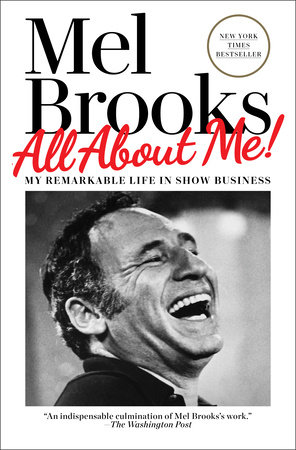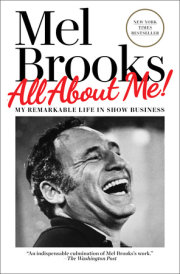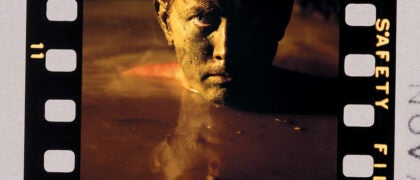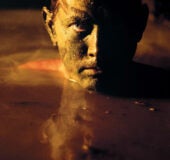Chapter 1
BrooklynIt is 1931, I am five years old, and my older brother Bernie takes me to see a movie called Frankenstein at the Republic Movie Theatre. Big mistake! That evening, even though it was a hot summer night, I closed the window next to my little bed. My mother hears it being closed and immediately comes into the bedroom and quickly opens it.
“Mel,” she says, “we’re on the top floor and it’s a hundred degrees in here. It’s very hot. We have to keep the window open.”
I counter with, “No, we must keep it closed! Because if we keep it open Frankenstein will come up the fire escape and grab me by the throat and kill me and eat me!”
(Even though it was the doctor who was named Frankenstein, all the kids called the monster Frankenstein because that was the title of the picture.)
My mother, realizing that she could never win by demanding that the window stay open, decides to reason with her five-year-old baby boy. “Mel,” she says, “let’s say you are right. That Frankenstein wants to come here and kill you and eat you. But let’s look at all the trouble he’s going to have to get to Brooklyn. First of all, he lives in Transylvania. That’s somewhere in Romania. That’s in Europe. And that’s a long, long ways away. So even if he decides to come here, he has to get a bus or a train or hitchhike to somewhere he can get a boat to go to America. Believe me, nobody is going to pick him up. So let’s say he’s lucky enough to find a boat that would take him here. Okay, so he is here in New York City, but he really doesn’t know how the subways work. When he asks people they just run away! Finally, let’s say he figures out it’s not the IRT, it’s the BMT and he gets to Brooklyn. Then he’s got to figure out how to get to 365 South Third Street. Okay, it’s going to be a long walk. So let’s say he finally gets to Williamsburg and he finally finds our tenement. But remember, all the windows at 365 are going to be wide open and he’s had a long journey, so he must be very hungry. So if he has to kill and eat somebody, he probably would go through the first-floor window and eat all the Rothsteins who are living in apartment 1A. And once he’s full, there is no reason for him to go all the way up to the fifth floor and eat you.”
The story made good sense to me. “Okay,” I said, “open the window. I’ll take a chance.” And that’s how my patient, loving mother solved only one of the many problems I would hand her each day.
Since we’re talking about me, let me go back to the very beginning. I was born on June 28, 1926. As far as I was concerned, a very good time to be born. Maybe not so good a date for the Archduke Ferdinand of Austria, as it was the twelfth anniversary of his assassination, which kicked off World War I. But in America things were good, we were still at peace and the Great Depression wouldn’t start until 1929. I was born in the Williamsburg section of Brooklyn, New York. That’s where the Williamsburg Bridge makes it way over to Manhattan. I was the last child born to Kate Kaminsky, whose maiden name was Katie Brookman. A little later on in life when I was fourteen and learning to be a drummer, it occurred to me that if I was going to be in show business, Mel Brookman was a much better stage name than Melvin Kaminsky (which would be a good name for a professor of Russian literature). So with my new stage name decided on I began painting it on my bass drum, but when I got to B-R-O-O-K- there was no room left for M-A-N. I only had room for one letter, so I threw in an S at the end of BROOK. Hence, Mel Brooks, which has stood me in good stead ever since. But let’s get back to Melvin Kaminsky.
Rumor has it that my mother said she already had three boys and the only reason she tried again was in the hopes that this last child would be a girl. The story goes that when the doctor delivered me and said to my mother, “You have a big, beautiful bouncing baby boy!”
My mother replied, “Do you want him?”
But I’m sure she was kidding. (At least I hope so.)
Being the baby of the family was good stuff. Everything went my way. I had three older brothers: Bernie who was four years older, Lenny who was seven years older, and Irving who was ten years older. I remember Bernie telling me one night that Daddy had come home with a little yellow rubber duck in his hand. Bernie was sure the duck was for him, but Daddy went right past his eager face and of course gave it to the baby—me. Bernie never forgave me for that. But my brothers were wonderful; we were like puppies in a cardboard box. We enjoyed one another’s company tremendously. Plenty of fights, but plenty of fun. My uncles and aunts also adored me, as I was the youngest. I was always in the air, hurled up and kissed and thrown in the air again. Until I was five, I don’t remember my feet touching the ground.
When I was only two years old my father died. Max, like so many others at that time, was swept away by tuberculosis. It wasn’t very traumatic to me at that age, but it was to my older brothers. I was probably six years old when I realized that other kids had fathers and I didn’t. It was a brushstroke of depression that really never left me, not having a father, another great wellspring source of love that every child is entitled to. My father’s absence caused a lingering frustration in my life. I felt cheated because he never got to enjoy being a proud father. It was a shame that he never got to see me succeed in my career.
The eldest of my brothers, Irving, kind of took over as a surrogate dad to us. We didn’t have much money, so during the winter, Irving would find a broken sled that somebody had thrown out and make a big present of it for me. Then he would pull me around the block on it in the snow. I’d say, “One more time, Irv, please!” and even though he had already done it twenty times and his hands were frozen, he still gave me one more ride around the block. Nothing quite like having an older brother.
Even though my brother Bernie wasn’t very tall (he was only five feet five), he was a great underhand softball pitcher and a great hitter too. Lenny used to catch for him. Bernie became one of the best-known pitchers in the schoolyard. I was so proud of him. Unfortunately, he peaked at fourteen.
My brother Lenny was especially good to me on Saturday nights. When he left the house, god bless him, he would flip me a half a buck. (A small fortune to a little kid!) For half a buck in Brooklyn in those years I could go out with my friends and get a salami sandwich and a Dr. Brown’s Cel-Ray tonic. And then I still had money left over for joining my friends at the movie house for a Saturday night double feature. And after that I still had fifteen cents left so I’d end up in an ice cream parlor and I’d have a frappe—two scoops of vanilla ice cream smothered in chocolate syrup with a cherry on top. Half a buck. It covered all of it!
Lenny also got me hooked on swing music. He was madly in love with Larry Clinton and his vocalist, Bea Wain, and with Shep Fields and his Rippling Rhythm, which sounded like somebody blowing bubbles into a glass of seltzer water. Lenny spent all his money on clothes; especially on a fedora hat he bought from Moe Penn’s, a hat store in Williamsburg. For twenty minutes he just worked the brim to get it exactly right. I used to sit on the toilet seat, cover down, and watch Lenny as he adjusted his Moe Penn hat in the medicine chest mirror. He would try the brim up and then shake his head no. Put the brim down front and back and shake his head no. Put the back up, put the brim down in front, and then with a broad smile on his face nod his head yes. He was happy. A private moment that I’ll always be grateful to him for allowing me to share.
My brothers were all wonderful. And even though they didn’t have a father of their own, they made sure that this little half-orphan, Melvy, who would never get to know his father, was cared for and looked after.
Not by choice, my mother became both parents. After my brothers were old enough to work, Kitty was able to stay home with her youngest son, me, “Melvy.” We got to know each other. She was my first comic foil, and enabler, and nurtured my imagination. On a Saturday morning she would give me three empty milk deposit bottles, which, upon return to the grocer, got me three cents each. Nine cents, I was short one penny to get into the movie house for a matinee. And believe it or not, during the Depression sometimes we didn’t have that extra penny in the household. So my mother would go next door to borrow a penny from a neighbor so that I could make the dime for the movie ticket.
I couldn’t wait for Saturday morning. The movie theaters opened at ten o’clock and we’d all be there. It was the beginning of a lifelong love affair. For one thin dime, you got two feature films, serials, a race, a newsreel, an animated cartoon, and coming attractions. Movies were magic. You stepped out of the real world (which had terrible things in it, like homework) and into a land of happy endings where dreams came true. There was nothing like the movies. My mother would send me to the theater with a salmon and tomato sandwich, wrapped in wax paper—“’cause it’s a long day, you know?”
Copyright © 2021 by Mel Brooks. All rights reserved. No part of this excerpt may be reproduced or reprinted without permission in writing from the publisher.








